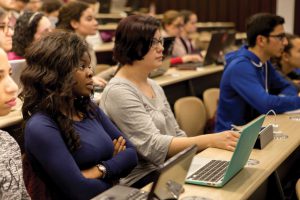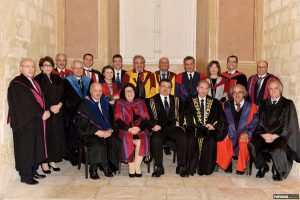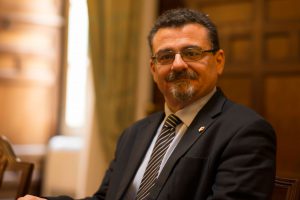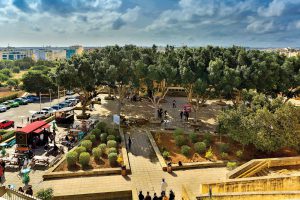Outgoing rector Prof. Juanito Camilleri has transformed the University of Malta both in terms of its infrastructure as well as its mindset. Despite the great strides it has made in the past ten years, he believes the revolution is still to come. This change needs the political class to give it the autonomy it deserves. He speaks frankly to Dr Edward Duca.
Ideas are cheap. But, as the saying goes, execution is key. When trying to manage and steer a university full of academics brimming with their own ideas, the implementation of any idea needs incredible strategic manoeuvering. Prof. Juanito Camilleri (University of Malta [UoM] rector from 2006 till 2016) appears to have succeeded in not only coming up with good ideas, but in deftly implementing them in order to lead the UoM through major infrastructure transformations and changes in mentality, resulting in an upgrade of both its outer layer and inner core. Yet Camilleri is skeptical of this analogy, and insists that the revolution is still to come.
He identifies the first collective agreement for academics (read more) signed under his watch as a fundamental game changer. The agreement, he recalls, made it very clear that the University’s aim was to become a modern third generation university based on three pillars: teaching, research, and outreach. When Camilleri was elected rector in 2006, some had criticised the UoM as being simply a glorified secondary school.
During the last decade, teaching programmes have been rationalised and the day and evening course portfolio expanded. The UoM now has over 700 degree programmes. ‘We worked very hard to build the notion of quality assurance and develop the systems to support it.’ The University invested a lot in blended learning, which fuses traditional and online education (using Moodle to implement a virtual learning environment). The University also invested in the Library’s digital resources and built the IT services centre as the underlying eLearning infrastructure to support a novel form of education (read more).
Since 2006 research has skyrocketed, with publications quadrupling in the space of ten years (read more). ‘We have shown that what we thought was unachievable in the past is achievable even for a small country like Malta,’ asserts Camilleri. He underlies that ‘yes, research is important for the country; yes, spawning companies from university intellectual property is possible, as is having a committed academic and administrative staff focused on creating the jobs of tomorrow. […] We have shown that things have become better and must become even better.’
A flourishing university transforms a country. The UoM’s outreach projects have been greatly expanded (read more). The past few years have seen NGOs for the first time in Malta fund research through the University’s Research Trust (RIDT), while the University boasts a slick research magazine called Think to tell its own stories. UoM has also reached out into local communities having invested in the Cottonera Resource Centre, targeting an area of Malta with the fewest graduates.
Camilleri’s most significant achievement is probably ‘the change in mentality and mindset’ that he induced. ‘A change in the semantics of power, where power is not the power to chastise, nor the power to clip wings, but rather where power is the ability to empower and give space for others to grow. […] I think this is why the [UoM’s] budget and profile have grown.’ The institution’s income has doubled and doubled again in ten years and ‘the results speak for themselves.’
Camilleri does not identify the exponential increase as his doing alone, but rather the people around him. ‘I think many [members of staff] started to believe they could achieve more and got down to achieving more. When you see the aggregate of all that achievement, that is really the game changer—it is all about creating the right environment.’
The ‘can do’ culture is ‘still in its formative stages.’ Camilleri points out how the University is ‘creating enabling environments where some of [its] very best brains are choosing to stay [t]here because they feel that although there might be better facilities abroad they can still have Malta as their base and grow academically.’
Engine Upgrade
 A thorn in the UoM’s side is that it cannot plan far ahead. The reason is that its finances are dictated by a government-allocated annual budget. It can only augment its finances through EU funding, industry collaborations, postgraduate programmes, and non-European students—amounting to around 20% of the total budget sustained over the past years. This makes long-term strategies and plans difficult since budgets are unpredictable. Camilleri admits that ‘[the government] has systematically increased the University’s budget so that the progress we have registered was possible’. He values the contributions of all political parties in government, and gratefully acknowledges the sustained increase in funding during his tenure. Yet, he stresses that ‘the University must outgrow what any government can or cannot afford […],’ going as far as to say that ‘we need to find [a new] financial model. We need to find some special purpose vehicle to give the University financial autonomy. This freedom should allow it to generate substantial funds for research and give it the legal stature necessary to forge its own partnerships with business and civil society. The University must invest in spin-out companies to build its own future.’
A thorn in the UoM’s side is that it cannot plan far ahead. The reason is that its finances are dictated by a government-allocated annual budget. It can only augment its finances through EU funding, industry collaborations, postgraduate programmes, and non-European students—amounting to around 20% of the total budget sustained over the past years. This makes long-term strategies and plans difficult since budgets are unpredictable. Camilleri admits that ‘[the government] has systematically increased the University’s budget so that the progress we have registered was possible’. He values the contributions of all political parties in government, and gratefully acknowledges the sustained increase in funding during his tenure. Yet, he stresses that ‘the University must outgrow what any government can or cannot afford […],’ going as far as to say that ‘we need to find [a new] financial model. We need to find some special purpose vehicle to give the University financial autonomy. This freedom should allow it to generate substantial funds for research and give it the legal stature necessary to forge its own partnerships with business and civil society. The University must invest in spin-out companies to build its own future.’
We have shown that what we thought was unachievable in the past is achievable even for a small country like Malta.
This new financial model needs to be realistic. It needs to ‘correlate desired outputs to the investment input required.’ Every student costs the UoM money depending on the course they undertake. Every student must be supported by an acceptable standard of research and administrative infrastructure.
Camilleri believes that what is holding the UoM back is ‘that the political class have yet to be convinced of University’s dire need for the necessary financial and administrative autonomy.’ Camilleri does not see the current picture as negative, but as a work in progress. The results achieved are not the revolution required for UoM to enter the next league. ‘For the University to continue to operate as a cornerstone of our economy and society we need a quantum leap forward.’
Looking to the future, a new law is being drafted: ‘The University of Malta Act’. Camilleri hopes that ‘we will get this one right.’ With any luck, the law will recreate the UoM as a new ‘public equivalent body,’ a quasi-public entity. ‘The University of Malta would be empowered by an act of law. Within it, there would be all the necessary cross checks and balances for UoM to be transparent and accountable, while governing itself without a financial or administrative leash.’
 The government’s current funding mechanism for the UoM needs to change. ‘It should reflect the underlying cost of education of the student cohort in hand, bearing in mind that the cost of training doctors, lawyers, engineers, teachers, lab-based scientists, and others is intrinsically different,’ maintains Camilleri. A formula-funding mechanism should be agreed to, the University has already conducted a detailed analysis of the cost-base of each type of diploma/degree programme it offers. Therefore the cost of each student, on a programme by programme basis is known, and the subvention required to adequately fund the education of a student body can be determined quite accurately.’ He believes that, ‘the relationship between government and the University of Malta needs to evolve into a client to service-provider relationship with government covering the true costs for the services it receives,’ a powerful statement.
The government’s current funding mechanism for the UoM needs to change. ‘It should reflect the underlying cost of education of the student cohort in hand, bearing in mind that the cost of training doctors, lawyers, engineers, teachers, lab-based scientists, and others is intrinsically different,’ maintains Camilleri. A formula-funding mechanism should be agreed to, the University has already conducted a detailed analysis of the cost-base of each type of diploma/degree programme it offers. Therefore the cost of each student, on a programme by programme basis is known, and the subvention required to adequately fund the education of a student body can be determined quite accurately.’ He believes that, ‘the relationship between government and the University of Malta needs to evolve into a client to service-provider relationship with government covering the true costs for the services it receives,’ a powerful statement.
Camilleri is disappointed that this new financial model, and legal and operational framework have not yet been implemented. ‘I have not managed to convince either administration of the fundamental change required. If you want the University to develop a different, improved persona then we need to change its DNA, we need a new engine model!’ However, these changes will bring more responsibility. ‘There will be more bureaucracy, not less, even if it is smart bureaucracy.’
That bureaucracy needs to translate into accountability. Currently, ‘it is practically impossible to fire anybody because of an unwieldy process with layers upon layers where inefficiency and mediocrity can hide.’ His biggest dismay it seems are a handful of academics who ‘cause 90% of the issues and bad feelings. […] Sometimes they are right, sometimes they are not, but once issues are duly debated and decided, people ought to put personal feuds aside and work as a team to move on. This very small minority tend to see things their way or “no way”! Again this lack of teamwork is frustrating.’ At times certain academics follow ‘their own agendas and do not always act in the University’s best interests.’
A University for Malta
The University and the Maltese Islands are inextricably intertwined, so much so that Camilleri refers to the institution as ‘the beating heart of the islands.’ Because of this, then, the UoM must adopt an approach that infuses it within society.
For Camilleri the UoM is paramount to the development of Malta’s identity. ‘The Maltese identity,’ he believes, is not only drawn from its past but refined by current ‘thought processes and sensitivities, that nurture an understanding, reflection, and introspection which help build a contemporary Maltese psyche.’
The corollary to this, is that intellectual thought should be cultivated. Camilleri notes however, that ‘there isn’t one perspective that needs to dominate others, but that it is the whole process of debate, the level of intellectual engagement, the research that takes place, the minds that are developed, that are important.’ These, he asserts, ‘are the crucial ingredients that will make Malta sustainable.’ They will define what it means to be Maltese: ‘The intellectual activity at University should be driving and feeding our democracy.’
Camilleri gives tremendous value to the University, noting how it ‘has never been as important to Malta as it is today.’ As Malta continues to diversify its economy and build economic resilience, the ideas, values, and business emerging from the UoM are needed to drive the country forward.
But there is more to be done. ‘There needs to be another fundamental game change that could not have happened ten years ago,’ he expounds. I think we have proven that this can be a world-class university. […] Had it not taken so long to get this far, I would have been very happy to lead the next phase […] but it’s a good thing that a new administration is coming in to actually pick up from this point and place this particular debate on the agenda.’ That great debate is the UoM’s financial model, and its legal and operational framework.
A vision, a hope

Rector Prof. Juanito Camilleri together with the President of Council, Dr Michael Sciriha, Pro-Rectors Prof. Alfred Vella, Prof. Mary Anne Lauri, Prof. Joe Friggieri and Prof. Richard Muscat, and the College of Deans. – Photo by Tufigno Photo & Video Services
Over the past decade campus life has become much richer. The library is full of students all year round, while the canteen becomes incredibly noisy over lunch. Student organisations have flourished, with students gaining credits for work outside of their course through the DegreePlus programme (informal courses from journalism to badminton are available). But Camilleri demands more. He envisages a university with a ‘bohemian style of education.’ Teach the subject but allow students to ‘wander, perhaps aimlessly, in what it is that makes them them, what it is that they want to be in this society of ours.’
He also believes that University life needs to be vibrant. The UoM should have ‘a continuously open library, with recreational facilities open 24/7.’ These aspirations need planning and financing. The necessary infrastructure has been penciled into a master plan (read more). This ‘plan could take another 20 years to achieve but at least there is a greater vision we can strive towards.’ The strategy goes beyond Camilleri or his rectorship. It seeks to create ‘performance spaces and laboratories: a research and creative milieu that nurtures minds and hearts,’ while building ‘communities of scholarship where the delivery of what one needs to know is done in the most enjoyable way, with a community of people acting as role models. Ultimately, this melting pot will translate into what it means to be Maltese in this globalised ever-changing world.’
I think we have proven that this can be a world-class university. […] Perhaps it’s a good thing that a new administration is coming in to […] place this particular debate on the agenda.
With the staggering technological developments underway, a university should help answer the question ‘What does it mean to be human?’ This is a question that needs interdisciplinary work between arts, sciences, and every field in between. ‘We need postdocs who think outside the box to create clusters of excellence or to project raw talent.’ A post-doctorate centre, currently being constructed, will help nurture this. ‘Start-ups and company spinoffs are very important for a university.’ The Knowledge Transfer Office and Takeoff Business Incubator are trying to create this movement. The university experience needs to become ‘more cognitive and more meaningful to create learning experiences that one cannot gain anywhere else but on a vibrant real-world campus.’
The lofty heights Camilleri sees need a ‘change in our engine model.’ Despite a long list of successes, he sees that a lot more work is needed. More so, a revolution is needed that would change the very essence of both the University and Malta—a practical dream.







